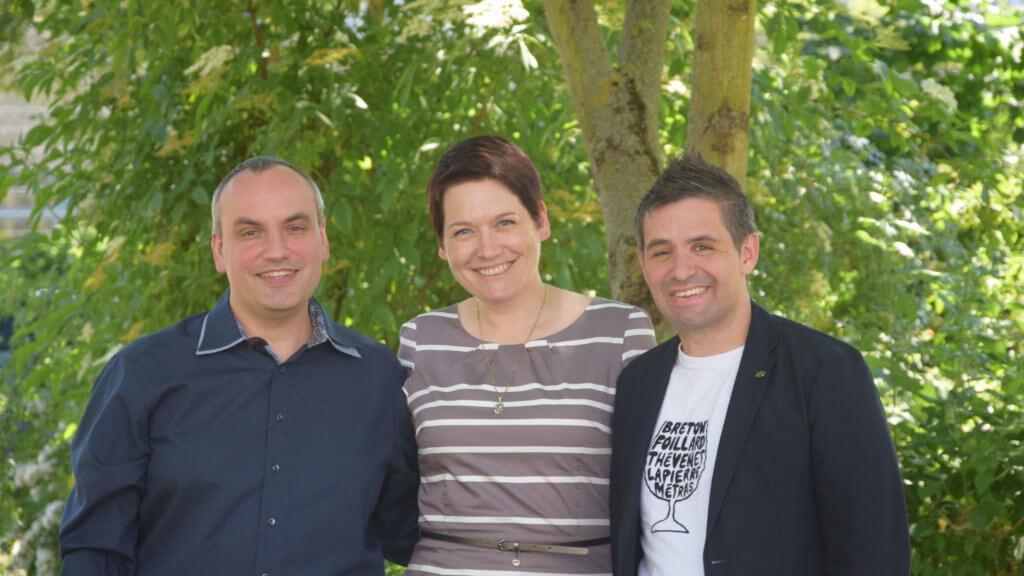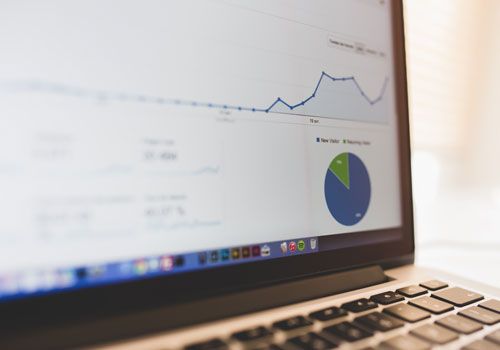How human perception can be digitized
Judith Hillen
Smell, taste, see, feel: Everything we can perceive with our senses, Genie Enterprise wants to transform into digital applications. Although the startup, which is part of the 5-HT network, is based in the USA, all research and development activities take place in the immediate vicinity of the Digital Hub in the Regional Innovation Center Ludwigshafen TZL. Here, Genie Enterprise conducts research on various topics in the field of human sensory technology and develops AI solutions for customers from various industries. In an interview with 5-HT, CEO and founder Regina Keßler and CTO Thomas Keßler give insights into the work of Genie Enterprise and also present their new product Heartbeat, with which they want to improve individual health care.

Genie Enterprise Thomas Keßler, Regina Keßler, Jean-Paul Okada
What is the idea of Genie Enterprise?
Regina Keßler: Genie Enterprise digitizes human perception and expert knowledge. We translate everything we can smell, taste, see and feel into solutions for customer problems. Our first product was WineGenie, a digital sommelier for personalized wine recommendations. However, we are now working on many different projects beyond the food industry, for example in the chemical and health care sectors.
Thomas Keßler: Our business model is based on three pillars. Firstly, we have our own products, such as WineGenie or our new medical product Heartbeat, for which we are still in the early stages of development. Secondly, we provide ready-to-use building blocks that our customers can integrate into their applications or use as a complement to them. Third, we offer consulting services and carry out contract work. These three pillars enable us to identify interesting topics from practical applications and finance our extensive research and development activities. These include both master theses in the fields of data science and AI, which are written at our start-up, and larger, publicly funded research projects in cooperation with various research institutes.

How did Genie Enterprise come to be founded?
Thomas Keßler: It all started with our digital wine sommelier WineGenie. Traditionally, a sommelier tastes different wines, assesses the taste of a customer and recommends a suitable product based on this. We thought about how we could digitalize this profession. When we realized that we needed sensors that could smell and taste, we started researching in this field. Soon after, we began to look at how sensor technology could be used to digitize human perception in other areas as well.
Regina Keßler: Two years ago we finally founded our company in the USA because we saw a larger market for our product there compared to Germany. However, all research and development takes place at our Ludwigshafen site, where we have access to an excellent research network and highly qualified specialists from around the world.
With your new product Heartbeat you are now moving into the health sector. What is this project about?
Thomas Keßler: In the course of #WirVsVirus and #EUvsVirus hackathons, which we participated in during the corona crisis, a new research consortium has been formed around the topic of health care. Our idea is to digitize the human perception of a person's state of health. Often, one can intuitively notice when another person is not feeling well, for example because the voice or facial expressions are different from normal. We want to transfer these aspects into a digital tool that gets to know the normal state of a person and, with the help of video, microphone and smart wearables, registers when something changes, for example in facial expressions, voice, breathing sounds or skin color. Based on this assessment of the person's general state of health, the app can then recommend that they consult a doctor. This can be useful because many people do not take good enough care of themselves or are not sure whether they are "sick enough" to go to the doctor. Our medical product goes further than already established fitness trackers because we include features that are difficult to measure, such as voice color. For this project, we are currently looking for partners in the health care sector and industry who want to work with us on research, development and implementation.

What projects have you already implemented in the service area with your previous customers?
Thomas Keßler: For a manufacturer of agricultural machinery, for example, we have developed a solution for planning and documenting the use of chemicals in agriculture: Supported by sensor data, the customer receives recommendations as to when which chemicals should be applied in which combination. For the automotive industry, we are currently developing a sensor system to digitize the testing of the odor quality of plastic parts in the interior of vehicles. In addition, we are currently working on a solution for a heating construction company to optimize the maintenance of their products. The range of possible industries and applications is therefore very wide.
In your experience, how do German and US customers differ from each other?
Regina Keßler: In Germany, companies often shy away from starting a digitisation project. In the USA, on the other hand, it is easier to convince the industry of new ideas. Among the more open-minded companies in Germany, however, we are also seeing that the issue of digitization has gained enormously in importance as a result of the Corona crisis. We therefore hope that this openness to new ideas will continue in the future.
What are the next goals for Genie Enterprise?
Thomas Keßler: We are currently preparing a number of projects for customers that we acquired during the Corona crisis. In addition, the final preparations and approvals for various research projects related to human sensory perception are pending. We have already found strong partners for research into complex food flavors, for example, with the Environmental Campus Birkenfeld at Trier University of Applied Sciences, the Lüdenscheid Plastics Institute and Fraunhofer IIS in Erlangen. In another research project on Federated Learning, we want to address the question of how we can manage to learn something from locally stored data at a higher level while at the same time protecting data privacy.
Regina Keßler: As soon as these research projects start, we will certainly double our team. We have also used the Corona crisis to think about professionalizing our processes and sharpening our corporate identity. So we have a bulging portfolio of upcoming projects and are just waiting for the go-ahead.
What do you hope for the future from the cooperation with 5-HT?
Regina Keßler: As we are now entering the healthcare sector with our new product Heartbeat, we are looking forward to opportunities for professional exchange. Here we would like to learn more about the special conditions we have to pay attention to in the industry and which pitfalls we can avoid. But we are also open to supporting other startups, for example with questions about AI and machine learning, or discussing their business model with them. As we have several years of professional experience behind us, we are happy to be available as mentors, because networking ultimately means supporting each other and also promoting the ideas of others.
5-HT Chemistry & Health Newsletter
Want the latest tech and industry news, events, relevant info from the ecosystem and more?
Subscribe to 5-HT Newsletter now Subscribe to 5-HT Newsletter now
Become part of the 5-HT Chemistry & Health
Exchange ideas with innovative startups and future-oriented companies in our ecosystem. We look forward to meeting you!